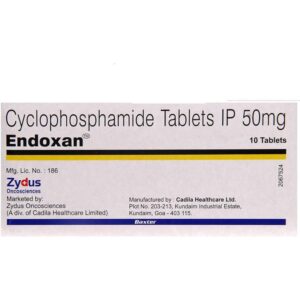CYCLOPHOSPHAMIDE
CYCLOPHOSPHAMIDE: Cyclophosphamide is a chemotherapy drug that is used to treat various types of cancer, including lymphoma, leukemia, breast cancer, ovarian cancer, and multiple myeloma. It can also be used to suppress the immune system in some autoimmune diseases, such as rheumatoid arthritis and lupus.
The mechanism of action of cyclophosphamide involves interfering with the DNA synthesis and replication process, thereby inhibiting the growth and division of cancer cells. It achieves this by forming covalent bonds with DNA molecules, which leads to DNA cross-linking and ultimately cell death.
Cyclophosphamide is typically administered orally in the form of tablets or intravenously as an injection. The dosage and frequency of administration may vary depending on the specific condition being treated, the patient’s body weight, and other factors. It is usually prescribed by a healthcare professional and should be taken strictly as directed.
As with most chemotherapy drugs, cyclophosphamide can cause various side effects. The most common side effects include nausea, vomiting, loss of appetite, hair loss, diarrhea, mouth sores, and increased risk of infections. It can also potentially cause bone marrow suppression, leading to a decrease in red and white blood cells and platelets, which can result in anemia, increased susceptibility to infections, and an increased risk of bleeding. Other less common side effects may include bladder irritation, kidney damage, and fertility problems.
It’s important to note that cyclophosphamide can have serious adverse effects, and it is essential for patients to be closely monitored by their healthcare providers while receiving treatment. The healthcare team will assess the patient’s overall health and adjust the dose or frequency of administration as needed to minimize side effects and maximize the benefits of the drug.


